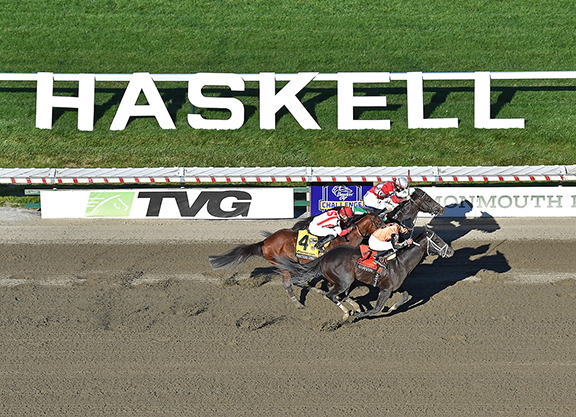By Bill Finley
A bill to provide Monmouth Park with a $10-million annual subsidy for five consecutive years passed the New Jersey Assembly Thursday and is expected to be signed into law by New Jersey Governor Phil Murphy.
The money replaces a $17-million annual subsidy given to Thoroughbred racing by the Atlantic City casinos, one that then Governor Chris Christie pulled the plug on in 2011. Since, Monmouth has struggled to compete with other Mid-Atlantic area tracks that receive casino money and have the ability to offer larger purses.
But what separates this subsidy from those in other racing states, including those that funnel slots money to the racetracks, is that Monmouth will not be getting a free ride. Neither will the state's two harness tracks, The Meadowlands and Freehold, which will also share in the subsidy that totals $20 million for the two breeds.
There are several provisions in the bill that the tracks must meet. If they fall short of those goals, the purse subsidy could end. Many of the provisions are requirements that involve the breeding industries for both Thoroughbred and Standardbreds, so far as increasing the number of mares and foals in the state. The New Jersey breeding industry has been decimated over the last several years. The legislation also calls for Monmouth to improve in areas that involve on-track business.
According to Dennis Drazin, who heads the management team that operates Monmouth, the government is requiring Monmouth to show increases in attendance, handle, field size and, oddly, the number of horses four years or younger stabled in New Jersey for the majority of the year.
“I don't think we have to hit every one, but they're trying to be responsible,” Drazin said. “You have to look at the legislature and what message they're trying to send. There are a lot of groups out there saying why should horse racing get $100 million when there are other needy parties? I saw some criticism this morning that Governor Murphy vetoed a homeless bill; the reasons had nothing to do with us. But there are some people that don't think we should be getting this money. The legislature is trying to be responsible, saying we're not going to hand out $100 million if it's not going to make a difference”
Drazin said he was confident Monmouth would meet the criteria.
“I'm going to spend my money in a way that we meet the goals,” he said. “When I go in and decide how to spend it, I want to make sure I have their requirements in mind when I make decisions as to how to spend our money. I will reestablish the 40% bonus for New Jersey-breds running in open company, which should definitely encourage people to breed in the state. I'm not going to do things that are foolish. We were going to run until Dec. 7 at Meadowlands, but no longer will do that. Those days were not going to produce good handle numbers for us.”
How Monmouth will allocate the purse money has yet to be decided and could become a subject of debate among local horsemen. All that is known for now is that Monmouth will hold a 61-day meet, plus six additional days of all turf racing at the Meadowlands. That's an increase of nine days over what was scheduled in 2018. Drazin said Monmouth would also race on Sundays in October. One of the benefits of that would be the possibility that NFL bettors will also wager on racing.
But, going forward, will Monmouth's direction lead toward additional racing dates or the same length of meet with higher purses? Some horsemen are in favor of having the purses hiked substantially for a portion of the meet, a mini-meet that mirrored the 2010 “Elite Meet” when Monmouth average nearly $1 million daily in purses. Still others want to see the purses stay the same with a substantial addition to the racing calendar. When asked what direction Monmouth would go, Drazin said, “I am not prepared to comment on that as of yet.”
No matter what direction Monmouth heads, the $10-million subsidy is seen as a major shot in the arm for an industry that needed one.
“We've been working very hard on this for at least a year because the subsidies we used to get helped us be competitive in the region where it is very difficult to compete with states that have slots and casino revenues and get hundreds of millions,” Drazin said. “But it is very meaningful to get a purse subsidy when you haven't had anything for years. It puts us in a position for the next five years where we have security. The breeding industry can understand that if they drop a foal in New Jersey today this is what they have to look forward to. Hopefully, there will be more mares and foals in New Jersey. On the racing end, it puts us in a more competitive position with the surrounding states. We'll never be at the New York level, but it puts us at higher level for our overnight purses structure and we'll be more in line with other tracks in the Mid-Atlantic region.”
Not a subscriber? Click here to sign up for the daily PDF or alerts.






